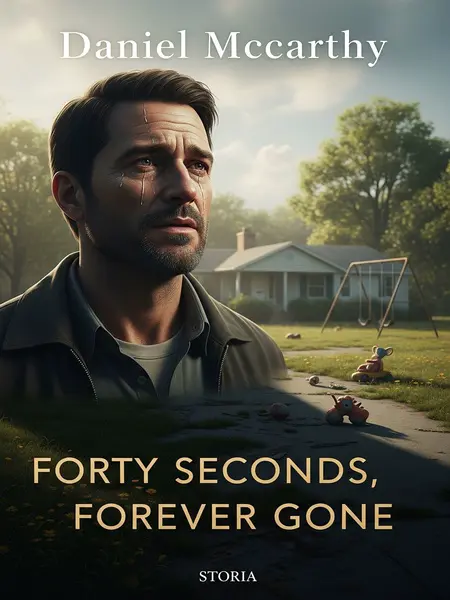Chapter 1: Forty Seconds to Gone
Ever wonder how long it takes for a child to go missing? Just forty seconds.
It’s a chilling question—one that echoes in every parent’s mind. Forty seconds. That’s all it takes. A life changed forever. The world tilts on its axis. It’s the kind of statistic you hear on the news or see on a missing child poster at the grocery store, but you never think it’ll be your kid. Not until it is.
This isn’t just a story—it really happened. A four-year-old boy, right here in America. Right in front of his father, he vanished from the world in just forty seconds after his dad turned away.
There’s something about that—forty seconds, a dad’s back turned—that just sticks with you. It doesn’t matter how careful you are; sometimes, you know, fate just sneaks up and knocks the wind out of you. For that family, those seconds became an eternity, replayed in nightmares and quiet moments for years to come.
It’s the most mysterious missing child case in American history—like something out of a real-life ghost story. The kind people still whisper about.
Even the local police chief—a tough guy, seen it all—would say this case haunted him. The story spread—neighbors whispered about it over backyard fences, and newspapers ran headlines that sounded like they belonged in a Stephen King novel. It was the kind of mystery that made parents double-check their locks at night. Made them hold their kids’ hands just a little tighter.
It was 1989, the tail end of the Reagan era. The country was booming. Optimism was everywhere.
The Berlin Wall hadn’t quite fallen yet, but the Cold War felt like it was winding down. People believed in the American dream. Minivans lined suburban driveways, and the airwaves were full of pop songs and morning talk shows. Everyone felt like anything was possible—until tragedy hit. That’s when you remember, even in good times, darkness can slip right in.
Daniel McCarthy was on a roll lately. Nearly forty, he was a software engineer who’d just landed a job at a tech startup, doubling his salary—he could hardly believe it.
He’d always kept his head down, worked hard. Always chasing the next promotion. Now, with a little extra cash in the bank, he was thinking about finally taking the family on that Disney trip he’d been promising for years. The future felt wide open. Like a brand-new notebook, just waiting for his story.
Daniel had it all—a thriving career, a happy family.
He wasn’t flashy, but he took pride in what he’d built. Every night, he’d come home to a house full of laughter, the smell of dinner in the oven, and the sound of his kids squabbling over who got the last slice of pizza. It wasn’t perfect, but it was his—and he wouldn’t trade it for the world.
They lived in Maple Heights, Ohio. About an hour out from Cleveland.
Maple Heights was the kind of place where everyone knew your name at the local diner. Friday night football brought the whole town together. The McCarthys’ house sat on a quiet street lined with maple trees that blazed orange and red every fall. It was a good place to raise a family—a little slice of Midwest comfort.
There were five in the family: his wife, Susan; their seven-year-old daughter; and two sons—Joshua, four, and Ben, two.
Emily, the oldest, was curious and whip-smart, always with her nose in a book. Joshua, four, was a bundle of energy—always asking questions, darting from one adventure to the next. Ben, the baby, was just starting to talk, toddling after his siblings with wide-eyed wonder. Susan held them all together. She was the steady one. The heart of the home.
At home, Daniel would look at his wife and kids—so kind, so adorable—and feel a twinge of guilt. His years of hard work had finally paid off, but it had come at the cost of overtime and missed holidays.
He remembered the birthdays he’d watched from behind a laptop screen, the Christmas mornings when he’d had to duck away for a conference call. Sometimes, it stung—realizing all the little moments he’d traded for a paycheck. But seeing his family now, safe and happy, he told himself it was all worth it. Still, a quiet voice inside reminded him that time was a gift—and it was running out, faster than he liked to admit.
From now on, I need to spend more time with my wife and kids. Life’s only going to get better, he told himself. It had to.
He made a silent promise right there at the kitchen table, coffee cooling in his mug. Maybe this year he’d coach Joshua’s soccer team. Maybe he’d take Emily to the science museum on Saturdays.
Then, suddenly, the phone rang—sharp and urgent, cutting through his thoughts.
The phone rang with the old-school ring that always made his heart skip. He glanced at the caller ID and saw Susan’s sister’s number. The way Susan’s face fell as she answered told him everything he needed to know, even before she spoke. The world seemed to slow down, the air thick with dread.
Bad news. Susan’s mother had passed away—suddenly, without warning.
Susan’s hands trembled as she set the phone down, her eyes filling with tears. Daniel pulled her close, feeling helpless in the face of her grief. The kids watched, confused and quiet, sensing that something had changed. The living room—so warm and bright just moments ago—felt cold. Unfamiliar.
At that moment, the McCarthys had no idea. The phone call was the first thread to unravel.
Funny how tragedy never announces itself. It just slips in, quiet as a Tuesday morning phone call. Looking back, Daniel would remember that moment as the last time everything felt normal. The start of a chain reaction he couldn’t have stopped, even if he’d tried.
The next day—March 6—the McCarthys packed up and drove to Susan’s hometown, Silver Hollow, Indiana. For the funeral.
The drive was long and somber, the kids fidgeting in the back seat while Susan stared out the window, lost in thought. Daniel kept one hand on the wheel and the other resting gently on Susan’s knee, trying to offer comfort without words. The landscape rolled by in shades of gray, winter clinging to the bare trees along the highway. The drive felt endless.
It all happened so fast, they didn’t even have a place to stay. The family drove another hour to stay at a relative’s house in a small town called Pine Ridge, where Susan’s family lived.
Pine Ridge didn’t even show up on most maps. Just a few houses, a faded gas station, one blinking stoplight. Susan’s aunt and uncle welcomed them with open arms, pressing hot mugs of cocoa into the kids’ hands and insisting they make themselves at home. It wasn’t fancy, but it was safe—a soft landing in the middle of chaos.
The car rolled to the end of a rural highway. Nothing but woods and farmland on either side.
The world felt huge out here—fields stretching on forever, the sky so open it made Daniel feel small. The kids pressed their faces to the windows, watching deer dart through the trees and crows wheel overhead. Somewhere in the distance, a tractor rumbled, the only sign of life for miles.
On one side of the road, a private gravel drive branched off. Following this path led to the relatives’ house, perched on a hillside halfway up the ridge.
The gravel crunched under the tires as they turned onto the drive, the car bumping over potholes. The house came into view—a weathered farmhouse with peeling paint, a wide front porch, and a swing that creaked in the breeze. It sat halfway up the slope, overlooking the valley below. Daniel thought it looked like something out of a postcard, the kind of place where time moved slower.
You don’t see many houses on hills in most of the Midwest. But here, it was normal.
Here, the land rolled and dipped, hiding little pockets of forest and streams. Daniel remembered Susan telling stories about sledding down these hills as a kid, her laughter echoing across the fields. It was beautiful, in a quiet, forgotten way.
The McCarthy family spent the night at the relatives’ place. The next morning, Daniel woke up early. While Susan made breakfast, he took the kids for a walk.
He slipped on his sneakers and zipped up his jacket, careful not to wake Susan. The kids were already bouncing with energy, eager to explore. He figured a little fresh air would help—and maybe give Susan a few moments of peace before the day’s sadness set in.
It was just after 8 a.m. Quiet. No other houses in sight.
The only sounds were birds and the distant hum of a tractor. The air was crisp, carrying the scent of damp earth and last night’s rain. The kids kicked at pebbles and pointed out animal tracks in the mud, their voices echoing in the stillness.
They only walked about ten minutes. Not much to see. Soon, the kids started complaining they were hungry.
Emily tugged at Daniel’s sleeve, her stomach growling. Joshua tried to chase a squirrel, but gave up when his little legs couldn’t keep up. Ben, still half-asleep, clung to Daniel’s hand. The promise of pancakes did the trick.
Emily and Joshua raced ahead up the stone steps. Daniel followed behind, carrying the youngest boy.
The steps were old, worn smooth by years of muddy boots and winter ice. Emily and Joshua made a game of it, seeing who could reach the top first. Daniel smiled, shifting Ben’s weight on his hip. He felt a rare moment of contentment.
Emily went straight inside, but Joshua dug in his heels. He wanted to stay outside, no matter what anyone said.
He planted his feet at the threshold, arms crossed, his face set in that stubborn little-boy frown Daniel knew all too well. “Just five more minutes, Dad!” Joshua pleaded, eyes wide and hopeful. Daniel chuckled, remembering his own battles over bedtime. It was such a normal moment—so ordinary, it almost felt safe.
Daniel had no choice but to say, “Wait here for a second. I’ll carry your little brother inside to Mom. Don’t go anywhere, okay?”
He crouched down, made sure Joshua looked him in the eye. “Promise me, buddy. Stay right here. I’ll be back before you know it.” Joshua nodded, kicking at a loose stone, already plotting his next adventure. Daniel ruffled his hair and hurried inside.
He carried the youngest boy into the entryway, handed him to his wife, and immediately turned back toward the door.
Susan looked up, her face tired but grateful. “Thanks, honey,” she whispered, gathering Ben into her arms. Daniel barely paused. He was already thinking about Joshua, probably bouncing on the porch, itching to run wild.
But the porch was empty. Joshua was gone.
The porch was silent, the morning sun slanting across empty steps. Daniel’s heart skipped a beat, a cold spike of fear shot through his chest. He called Joshua’s name, his voice catching in the still air. Nothing. Just the distant caw of a crow and the creak of the porch swing.
Less than forty seconds. That’s all it took.
Daniel’s mind raced, replaying every second—had he really only been gone that long? It felt impossible. He ran his hand through his hair, trying to tamp down the rising panic. Forty seconds. That’s all it took for everything to change.
At first, Daniel didn’t think much of it, assuming his son had just run ahead, too impatient to wait.
He forced himself to breathe, telling himself Joshua was probably just hiding behind a bush or chasing a stray cat. Kids wander off. Happens all the time. No need to panic. Not yet. He called out again, his voice a little louder this time.
He walked down the stone steps, looking around as he went, searching for any sign of his son.
The gravel crunched under his shoes as he scanned the yard—behind the porch, under the swing, around the old oak tree. He checked the driveway, peered into the thicket of trees at the edge of the property. Every shadow seemed suspicious. Every silence, heavy.
As he walked, a sense of unease crept in. The stone steps were about thirty feet long and very steep, each step about a foot high.
He realized how quickly a child could slip and fall—or vanish, just like that. The steps seemed longer now, the distance between each one yawning wide. Daniel’s breath came faster, his heart pounding in his ears. He called Joshua’s name again, louder, his voice edged with fear.
Just a moment ago, his son had struggled to climb each step.
He remembered Joshua’s little hands on the railing, giggling as he scrambled up. It didn’t make sense—how could a four-year-old disappear so fast? Daniel’s mind raced through every possibility, from the mundane to the unthinkable. He felt the first pricklings of real terror, the kind that settles in your bones and refuses to let go.
How? How could he just vanish, just because Daniel turned around for a second?
Daniel stood frozen at the top of the steps, the world spinning around him. He shouted Joshua’s name, his voice cracking. Somewhere deep down, he already knew: nothing would ever be the same again. Forty seconds. That’s all it took. Hope, gone. A father’s world, shattered.













